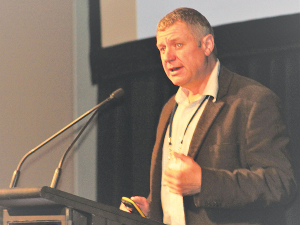Could ag come later in climate change action?
Diplomatic representatives speaking yesterday in Auckland believe there is a strong chance of global agreement in the upcoming climate negotiations in Paris in December.
 Climate scientist Dave Frame (pictured) and former climate change negotiator Adrian Macey argue why NZ bureaucrats and politicians need to adopt the more accurate measurement of livestock methane emission GWP*.
Climate scientist Dave Frame (pictured) and former climate change negotiator Adrian Macey argue why NZ bureaucrats and politicians need to adopt the more accurate measurement of livestock methane emission GWP*.
In their report for BusinessDesk, Adrian Macey and Dave Frame point out that the 30-year-old metric chosen by the UN to measure the different greenhouse gases (known as GWP100) is inaccurate for short-lived gases - such as methane.
"It greatly overstates the warming caused by NZ's methane in relation to the Paris Agreement's long-term temperature goal. Recent work by scientists has solved the problem by devising a different metrict, GWP*, which is an adaptation of GWP100 that very accurately replicates methane's actual warming."
Macey and Frame point out how even the latest IPCC (Intergovernmental Panel on Climate Change) report sums up the shortcomings of GWP100:
"Expressing methane emissions as CO2-equivalent using GWP100 overstates the effect of constant methane emissions on global temperature by a factor of 3 to 4, while understating the effect of any new methane emission source by a factor of 4 to 5 over the 20 years following the introduction of the new source."
However, the pair report that rather than adopt this 'simple fix', NZ government climate-change advisers have either ignored GWP* or dismissed it.
They add that while GWP* is attracting growing interest internationally, a small number of mainly European academics are 'hell-bent' on dissuading policymakers from having anything to do with it.
Macey and Frame explain these objections centre not on the metric itself, nor the science behind it, but on how policymakers would apply it.
"It's feared it would be used to justify a 'free ride' for agriculture or for NZ," they argue. "The 'free ride for farmers' charge is heard here, too. Suppositions about a metric's use for policy don't weaken the case for knowing methane's true impact on global temperature."
The pair also outline how and why NZ policy advice has been wrong on GWP*.
They criticise both the Climate Change Commission and the Ministry for the Environment for "a lack of understanding of the origin and purpose of carbon budgets" and for "a disconnect between measuring emissions and their warming".
Meanwhile, Macey and Frame believe that despite bureaucratic opposition to GWP*, there has been recent progress in understanding the importance of accounting accurately for warming.
"Until GWP* is adopted here, separate reporting of methane can achieve a similar result, though less conveniently than by using GWP"," they say.
"NZ's split gas domestic target is consistent with this approach, which would also be useful in carbon markets."
Farmers are being encouraged to take a closer look at the refrigerants running inside their on-farm systems, as international and domestic pressure continues to build on high global warming potential (GWP) 400-series refrigerants.
As expected, Fonterra has lifted its 2025-26 forecast farmgate milk price mid-point to $9.50/kgMS.
Bovonic says a return on investment study has found its automated mastitis detection technology, QuadSense, is delivering financial, labour, and animal-health benefits on New Zealand dairy farms worth an estimated $29,547 per season.
Pāmu has welcomed ten new apprentices into its 2026 intake, marking the second year of a scheme designed to equip the next generation of farmers with the skills, knowledge, and experience needed for a thriving career in agriculture.
One team with 43 head, including a contingent from Mid Canterbury, are reflecting on a stellar NZ DairyEvent.
Fonterra farmer shareholders have approved the mechanism for a $2/share capital return expected from the sale of its global consumer and associated businesses.

OPINION: Here w go: the election date is set for November 7 and the politicians are out of the gate…
OPINION: ECan data was released a few days ago showing Canterbury farmers have made “giant strides on environmental performance”.